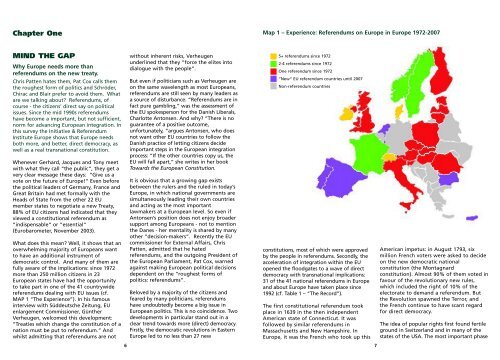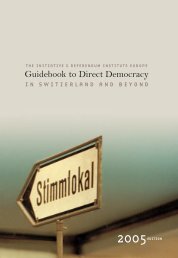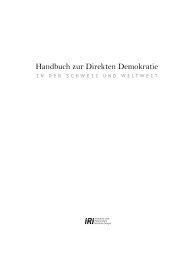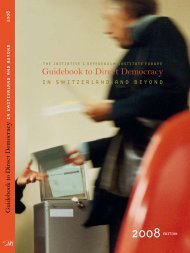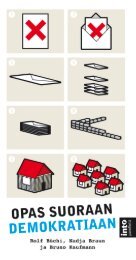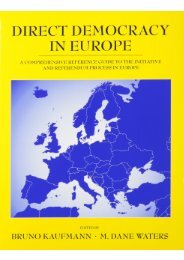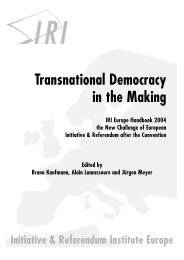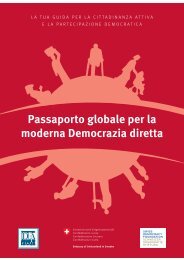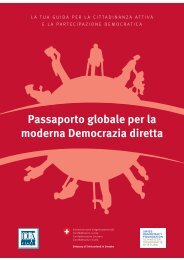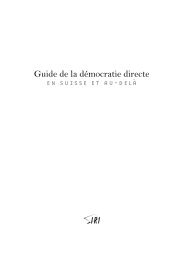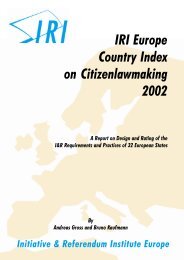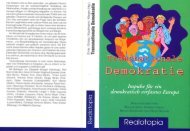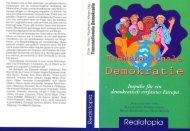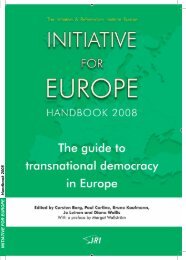Initiative & Referendum Monitor 2004/2005
The IRI Europe Toolkit for Free and Fair Referendums and Citizens’ Initiatives
The IRI Europe Toolkit for Free and Fair Referendums and Citizens’ Initiatives
Create successful ePaper yourself
Turn your PDF publications into a flip-book with our unique Google optimized e-Paper software.
Chapter One<br />
Map 1 – Experience: <strong>Referendum</strong>s on Europe in Europe 1972-2007<br />
MIND THE GAP<br />
Why Europe needs more than<br />
referendums on the new treaty.<br />
Chris Patten hates them, Pat Cox calls them<br />
the roughest form of politics and Schröder,<br />
Chirac and Blair prefer to avoid them. What<br />
are we talking about? <strong>Referendum</strong>s, of<br />
course - the citizens’ direct say on political<br />
issues. Since the mid 1990s referendums<br />
have become a important, but not sufficient,<br />
norm for advancing European integration. In<br />
this survey the <strong>Initiative</strong> & <strong>Referendum</strong><br />
Institute Europe shows that Europe needs<br />
both more, and better, direct democracy, as<br />
well as a real transnational constitution.<br />
Whenever Gerhard, Jacques and Tony meet<br />
with what they call “the public“, they get a<br />
very clear message these days: “Give us a<br />
vote on the future of Europe!“ Even before<br />
the political leaders of Germany, France and<br />
Great Britain had met formally with the<br />
Heads of State from the other 22 EU<br />
member states to negotiate a new Treaty,<br />
88% of EU citizens had indicated that they<br />
viewed a constitutional referendum as<br />
“indispensable“ or “essential“<br />
(Eurobarometer, November 2003).<br />
What does this mean? Well, it shows that an<br />
overwhelming majority of Europeans want<br />
to have an additional instrument of<br />
democratic control. And many of them are<br />
fully aware of the implications: since 1972<br />
more than 250 million citizens in 23<br />
European states have had the opportunity<br />
to take part in one of the 41 countrywide<br />
referendums dealing with EU issues (cf.<br />
MAP 1 “The Experience”). In his famous<br />
interview with Süddeutsche Zeitung, EU<br />
enlargement Commissioner, Günther<br />
Verheugen, welcomed this development:<br />
“Treaties which change the constitution of a<br />
nation must be put to referendum.” And<br />
whilst admitting that referendums are not<br />
6<br />
without inherent risks, Verheugen<br />
underlined that they “force the elites into<br />
dialogue with the people”.<br />
But even if politicians such as Verheugen are<br />
on the same wavelength as most Europeans,<br />
referendums are still seen by many leaders as<br />
a source of disturbance. “<strong>Referendum</strong>s are in<br />
fact pure gambling,” was the assessment of<br />
the EU spokesperson for the Danish Liberals,<br />
Charlotte Antonsen. And why? “There is no<br />
guarantee of a positive outcome,<br />
unfortunately, “argues Antonsen, who does<br />
not want other EU countries to follow the<br />
Danish practice of letting citizens decide<br />
important steps in the European integration<br />
process: “If the other countries copy us, the<br />
EU will fall apart,” she writes in her book<br />
Towards the European Constitution.<br />
It is obvious that a growing gap exists<br />
between the rulers and the ruled in today’s<br />
Europe, in which national governments are<br />
simultaneously leading their own countries<br />
and acting as the most important<br />
lawmakers at a European level. So even if<br />
Antonsen’s position does not enjoy broader<br />
support among Europeans - not to mention<br />
the Danes - her mentality is shared by many<br />
other “decision-makers”. Recently the EU<br />
commissioner for External Affairs, Chris<br />
Patten, admitted that he hated<br />
referendums, and the outgoing President of<br />
the European Parliament, Pat Cox, warned<br />
against making European political decisions<br />
dependent on the “roughest forms of<br />
politics: referendums”.<br />
Beloved by a majority of the citizens and<br />
feared by many politicians, referendums<br />
have undoubtedly become a big issue in<br />
European politics. This is no coincidence. Two<br />
developments in particular stand out in a<br />
clear trend towards more (direct) democracy.<br />
Firstly, the democratic revolutions in Eastern<br />
Europe led to no less than 27 new<br />
5+ referendums since 1972<br />
2-4 referendums since 1972<br />
One referendum since 1972<br />
“New“ EU referendum countries until 2007<br />
Non-referendum countries<br />
constitutions, most of which were approved<br />
by the people in referendums. Secondly, the<br />
acceleration of integration within the EU<br />
opened the floodgates to a wave of direct<br />
democracy with transnational implications:<br />
31 of the 41 national referendums in Europe<br />
and about Europe have taken place since<br />
1992 (cf. Table 1 – “The Record”).<br />
The first constitutional referendum took<br />
place in 1639 in the then independent<br />
American state of Connecticut. It was<br />
followed by similar referendums in<br />
Massachusetts and New Hampshire. In<br />
Europe, it was the French who took up this<br />
7<br />
American impetus: in August 1793, six<br />
million French voters were asked to decide<br />
on the new democratic national<br />
constitution (the Montagnard<br />
constitution). Almost 90% of them voted in<br />
favour of the revolutionary new rules,<br />
which included the right of 10% of the<br />
electorate to demand a referendum. But<br />
the Revolution spawned the Terror, and<br />
the French continue to have scant regard<br />
for direct democracy.<br />
The idea of popular rights first found fertile<br />
ground in Switzerland and in many of the<br />
states of the USA. The most important phase


